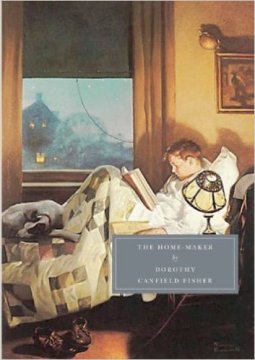Merry Christmas, everyone! This isn’t exactly a festive entry, but I have a real treat here in my one contribution to Doorstoppers in December. Although I had already read one book by Dorothy Canfield Fisher and thought it was far ahead of its time, The Deepening Stream was captivating.
This novel follows the life of its protagonist Matey from her first memories of childhood to the end of World War I. Apparently, the novel parallels Canfield Fisher’s own life, with the difference that Matey is a more ordinary person, according to the Introduction, than Canfield Fisher was, an everywoman.
Matey Gilbert and her sister Priscilla and brother Francis grow up affected by the state of their parents’ marriage, in which there is a continual state of one-upmanship. Matey’s father is a Midwestern college professor whose “company manners” are entertaining and charismatic and, Matey believes, false. But whatever his wife’s current interests are, he trivializes them, and his moods rule the household.
As a young teenager, Matey lives a year in Paris with the Vinets while her father is on sabbatical. (They always go to France because of her father’s field of study, where her mother cannot speak the language. A painful memory is the trip they took to the Netherlands, where her mother could speak but her father could not, and the fuss he made about it.) There she learns about a different kind of home life and a different way of conducting her own life. Used to running wild with little supervision, she sees that she is behind the Vinet children, who are younger, and begins taking her schoolwork and piano lessons seriously. She also feels at home.
Priscilla, whom Matey as a child believes is fearless, eventually copes with their home situation by making herself too busy to notice things, and this becomes a habit that continues to adulthood and keeps her from developing. Francis copes by treating everything as unimportant. Matey takes much longer to process her parents’ relationship, and it affects her throughout her life. However, when her father dies unexpectedly of an untreated wound, she is the only one to see that there was more to their parents’ relationship than they understood.
After her parents’ deaths, Matey learns that she has relatives on her mothers’ side that she has never heard of, because her parents never returned to her mother’s home after they were married and never talked about them. Matey has received a small bequest from her Cousin Constance, and when she goes to Rustdorf to inquire about it, she remembers her cousin’s home from when she stayed there as a child. At the bank, she meets Adrian Fort, a young distant cousin brought up as a Quaker who has just returned from Paris, where he has had to admit he’s failed as an artist and will join his father at the savings bank. He will become her husband, their relationship a close one. But she first has to learn how to be close to anyone.
With the advent of World War I, despite the U. S. neutrality, she and Adrian decide they want to go to Europe—Adrian to be an ambulance driver and Matey to use her legacy to help the Vinets and others who need it. Their friends and family are incredulous when they decide to take their two young children. Most of the rest of the book is about the struggles and conditions of World War I.
This is an absolutely fascinating novel. There were a few pages toward the beginning of the novel when Canfield Fisher was writing about the importance of play to children (childhood development being one of her interests) when I got a little bored, but after that, I was completely captured by the novel. It explores the intricacies of marital and other personal relationships, the influence of upbringing on children, the effects of war on humans, our responsibilities to others, and other issues that Matey thinks through, and it does all this without seeming weighty.
This is a terrific and thoughtful novel. It also is on my Classics Club list, so it serves two purposes. Three, really, because it is so, so good.





